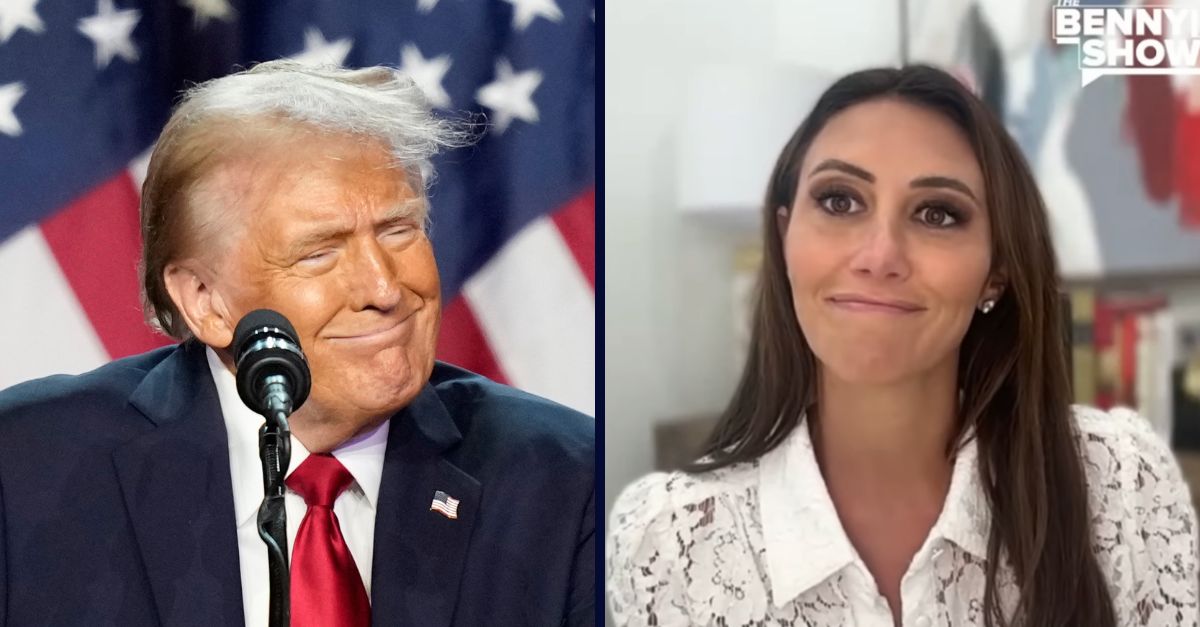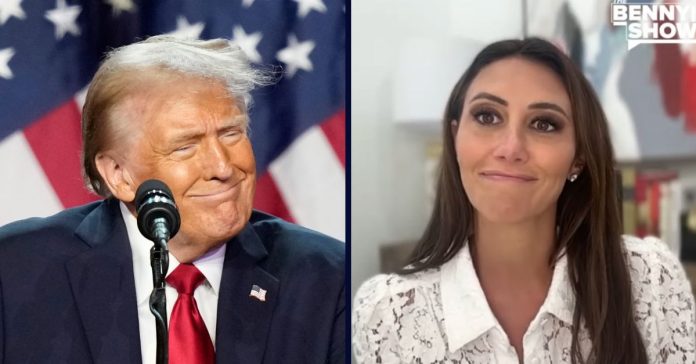
Left: Donald Trump speaks at an election night watch party, Wednesday, Nov. 6, 2024, in West Palm Beach, Fla. (AP Photo/Alex Brandon). Right: Alina Habba speaking in an interview about federal judges voting against extending her term as New Jersey’s top prosecutor (The Benny Show/YouTube).
With oral arguments in the near future, a group of 10 former U.S. attorneys weighed in on Alina Habba by backing criminal defendants who maintain that President Donald Trump’s former personal attorney was rightly disqualified from prosecuting them due to her unlawful appointment as acting U.S. attorney for New Jersey.
With the DOJ set to argue at the 3rd U.S. Circuit Court of Appeals on Oct. 20, the ex-U.S. attorneys, including Bill Barr’s former supervisor Donald Ayer, Harry Litman, MSNBC legal analyst Barbara McQuade, and Bill Weld, said the U.S. attorney role “should be filled only with experienced and competent personnel,” not a “neophyte” learning on the job or otherwise “unfit characters.”
Emphasizing that U.S. attorneys “wield broad authorities that can impact the lives, liberty and property of millions of people within their jurisdictions,” the amici curiae — or friends of the court — said Brann was correct to side in favor of criminal defendants Julien Giraud Jr., Julien Giraud III, and Cesar Pina.
To do otherwise, said the brief, would allow the president to “legally bypass” the advice and consent of the U.S. Senate required under the Constitution.
Love true crime? Sign up for our newsletter, The Law&Crime Docket, to get the latest real-life crime stories delivered right to your inbox.
Habba was first named interim U.S. attorney in March. It was a temporary role that came with a 120-day stint in office, unless she was confirmed by the Senate or appointed by a federal court. As Habba’s nomination languished in the Senate and as the clock ticked down on her interim tenure in July, federal judges ultimately declined to appoint her and instead named her then-first assistant Desiree Grace as U.S. attorney.
U.S. Attorney General Pam Bondi, claiming that “politically minded” and “rogue judges” had interfered with Trump’s “core Article II powers,” swiftly fired Grace. After Trump pulled Habba’s nomination as permanent U.S. attorney, Habba resigned as interim U.S. attorney and was appointed simultaneously to the ousted first assistant’s position under the Federal Vacancies Reform Act (FVRA), making her the top prosecutor again.
At the same time, in the event that legal authority was challenged, Habba was named a “Special Attorney to the United States Attorney General” under a federal statute governing the commission of special attorneys, giving her the power to act as a U.S. attorney through another means as the office’s supervisor.
Brann called it a “novel series of legal and personnel moves” that could enable the president to handpick, regardless of qualifications, his “personal choice for an entire term without seeking the Senate’s advice and consent.”
The former U.S. attorneys agreed that the government ran roughshod over the FVRA — a “carefully drafted statutory scheme” — and the purpose of the Appointments Clause of the Constitution.
“Amici categorically reject the Administration’s claim that the President can legally bypass Congress’s carefully drafted statutory scheme,” the brief said. “Acceptance of this argument would not only contravene statutory restrictions and the Appointments Clause of the United States Constitution, but as a policy matter, it would create the very danger that the Appointments Clause was drafted to address: the appointment of ‘unfit characters’ to critical Executive Branch positions.”
U.S. attorney, after all, is a serious job that should be “free from actual or perceived political interference and favoritism,” the brief continued.
“The job of the U.S. Attorney is not one that can be learned on the fly by a neophyte,” the brief said. “The job of a U.S. Attorney is unusually powerful, often involving life or death decisions for those within their jurisdictions.”
The Trump administration has opposed Brann’s interpretation of the FVRA, one that DOJ said could “cripple the functioning of government” if it stands up to appellate scrutiny.
The amicus brief filed Monday comes as DOJ is separately appealing the disqualification of Sigal Chattah in Nevada, a ruling that cited the Girauds’ case, and while fending off additional challenges.

